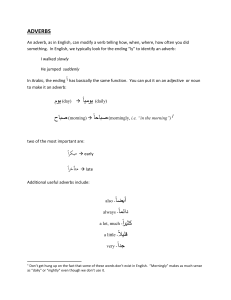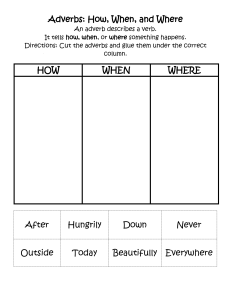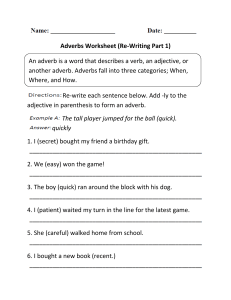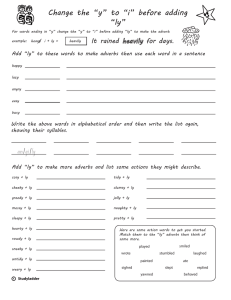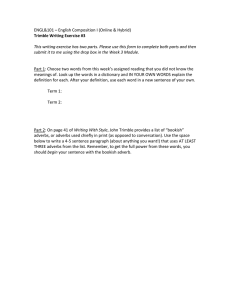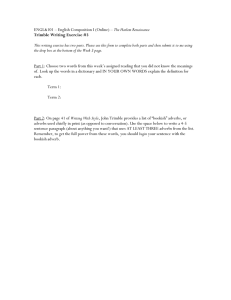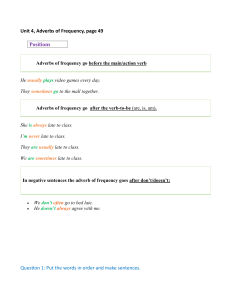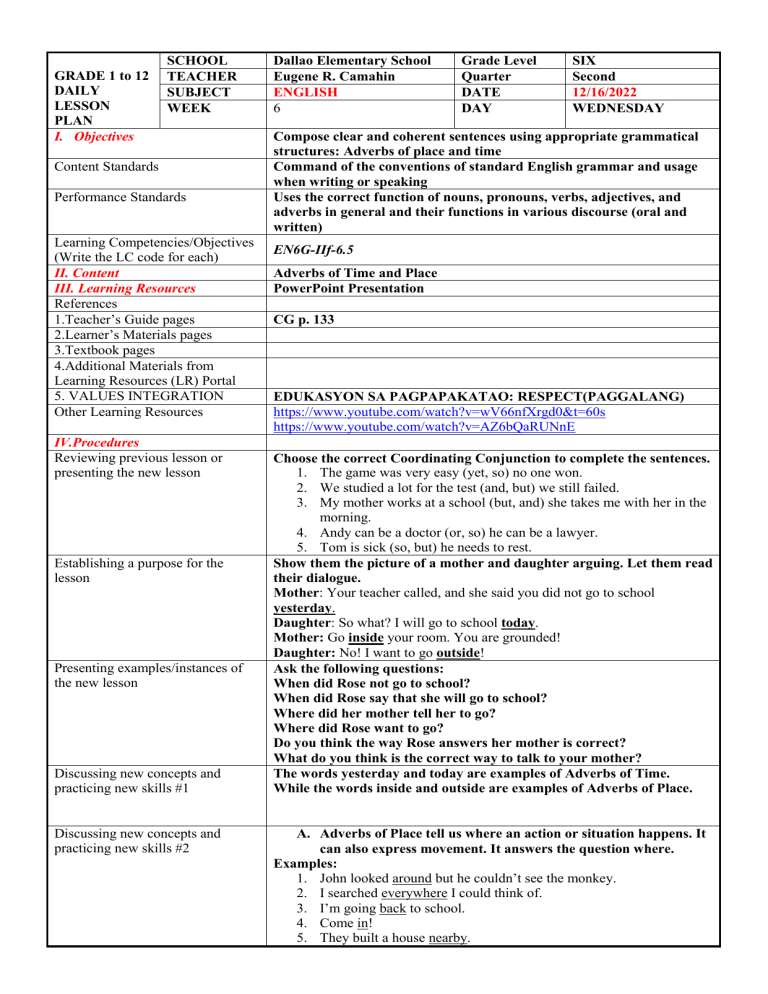
GRADE 1 to 12 DAILY LESSON PLAN I. Objectives SCHOOL TEACHER SUBJECT WEEK Content Standards Performance Standards Learning Competencies/Objectives (Write the LC code for each) II. Content III. Learning Resources References 1.Teacher’s Guide pages 2.Learner’s Materials pages 3.Textbook pages 4.Additional Materials from Learning Resources (LR) Portal 5. VALUES INTEGRATION Other Learning Resources IV.Procedures Reviewing previous lesson or presenting the new lesson Establishing a purpose for the lesson Presenting examples/instances of the new lesson Discussing new concepts and practicing new skills #1 Discussing new concepts and practicing new skills #2 Dallao Elementary School Eugene R. Camahin ENGLISH 6 Grade Level Quarter DATE DAY SIX Second 12/16/2022 WEDNESDAY Compose clear and coherent sentences using appropriate grammatical structures: Adverbs of place and time Command of the conventions of standard English grammar and usage when writing or speaking Uses the correct function of nouns, pronouns, verbs, adjectives, and adverbs in general and their functions in various discourse (oral and written) EN6G-IIf-6.5 Adverbs of Time and Place PowerPoint Presentation CG p. 133 EDUKASYON SA PAGPAPAKATAO: RESPECT(PAGGALANG) https://www.youtube.com/watch?v=wV66nfXrgd0&t=60s https://www.youtube.com/watch?v=AZ6bQaRUNnE Choose the correct Coordinating Conjunction to complete the sentences. 1. The game was very easy (yet, so) no one won. 2. We studied a lot for the test (and, but) we still failed. 3. My mother works at a school (but, and) she takes me with her in the morning. 4. Andy can be a doctor (or, so) he can be a lawyer. 5. Tom is sick (so, but) he needs to rest. Show them the picture of a mother and daughter arguing. Let them read their dialogue. Mother: Your teacher called, and she said you did not go to school yesterday. Daughter: So what? I will go to school today. Mother: Go inside your room. You are grounded! Daughter: No! I want to go outside! Ask the following questions: When did Rose not go to school? When did Rose say that she will go to school? Where did her mother tell her to go? Where did Rose want to go? Do you think the way Rose answers her mother is correct? What do you think is the correct way to talk to your mother? The words yesterday and today are examples of Adverbs of Time. While the words inside and outside are examples of Adverbs of Place. A. Adverbs of Place tell us where an action or situation happens. It can also express movement. It answers the question where. Examples: 1. John looked around but he couldn’t see the monkey. 2. I searched everywhere I could think of. 3. I’m going back to school. 4. Come in! 5. They built a house nearby. a. Adverbs here and there are placed at the beginning of the sentence in exclamations or when emphasis is needed. They are followed by a verb if the subject is a noun or pronoun. Examples: 1. Here comes the bus! 2. There goes the bell! b. Adverbs of place that end in -where express the idea of location without specifying a specific location or direction. Examples: 1. I would like to go somewhere warm on my vacation. 2. Is there anywhere I can find a perfect plate of spaghetti around here? c. Adverbs of place that end in -wards express movement in a particular direction. Examples: 1. Cats don’t usually walk backwards. 2. The balloon drifted upwards. d. Some of the adverbs of place express both movement and location. Examples: 1. The child went indoors. 2. Water always flows downhill. B. Adverbs of Time tell us when an action happened and also for how long. Examples: 1. When – today, yesterday, later, now, last year 2. For how long – all day, not long, for a while, since last year a. Adverbs of time that tell us when are usually placed at the end of the sentence. Examples: 1. We will watch a movie tonight. 2. I need to leave now. b. All adverbs of time that tell us when can be placed at the beginning of the sentence to emphasize the time element. Some adverbs may be placed before the verb. Examples: 1. Today, I will ride the MRT to Quezon City fast. 2. Dad will later talk to my teacher about my absence. Developing Mastery (Leads to Formative Assessment) Finding practical application of concepts and skills in daily living c. For how long adverbs of time are usually placed at the end of each sentence. Examples: 1. She stayed in the Bear’s house all day. 2. My mother lived in France for a year. Raise your right hand if the words are adverb of time and your Left hand if the words are adverb of place. 1. There 6. Near 2. Inside 7. here 3. Sometimes 8. Soon 4. Downstairs 9. Often 5. Now 10. Yesterday Group the learners into three. Let them arrange the words into sentences and circle the adverb of time or place in each formed sentence. 1. 2. 3. 4. 5. Making generalizations and abstractions about the lesson Evaluating Learning Additional activities for application or remediation V .Remarks VI.Reflection No. of learners who earned 80% of the formative assessment No. of learners who require additional activities to remediation C. Did the remedial lessons work? No. of learners who have caught up with the lesson D. No. of learners who continue to require remediation E. Which of my teaching strategies worked well? Why did these work? F. What difficulties did I encounter which my principal or supervisor can help me solve? G. What innovation or localized material did I use/discover which I wish to share with other teachers? attend-at-my-office-I-will-the-meeting upstairs-the-table-get-they-will home-time-most-of-the-I-stay-at will-she-stay-for-there-five days the-cabinet-basket-inside-put-the-father Clap once if the statement is True and clap twice if the statement is False. 1. Adverb of time tell us when, how long and how often an action happens. 2. Adverb of place tell us where the action or situation happens. 3. The word yesterday is an example of adverb of place. 4. The word upstairs is an example of adverb of time. 5. Adverb of time answers the question where. A. Choose the correct adverb inside the parenthesis. Write the correct answer in your notebook. 1. When it is raining, the kids must stay (outside, inside). 2. The office was closed, so we waited (nearly, nearby) until it opened. 3. There was nowhere to sit, so we just stand (there, where). 4. It was 6 a.m. and the sun was already (up, out). 5. The search party didn’t find anything here, so now they are looking (elsewhere, nowhere). 6. She put the hot dish down (on the table, when the bell went for lunch). 7. The competitors waited impatiently (near the fishing post, after the race). 8. David plays tennis energetically (most of the afternoon, by the river) 9. Belinda was moving the chairs noisily (last night, in her room). 10. The director spoke excitedly (at the rehearsal, on Monday). Answer the following questions in a complete sentence using adverbs of place or time. 1. Where did you go last night? 2. When is your meeting with your classmate? 3. Where is my T-shirt? 4. In what place are you going to have vacation? 5. When is your birthday?
